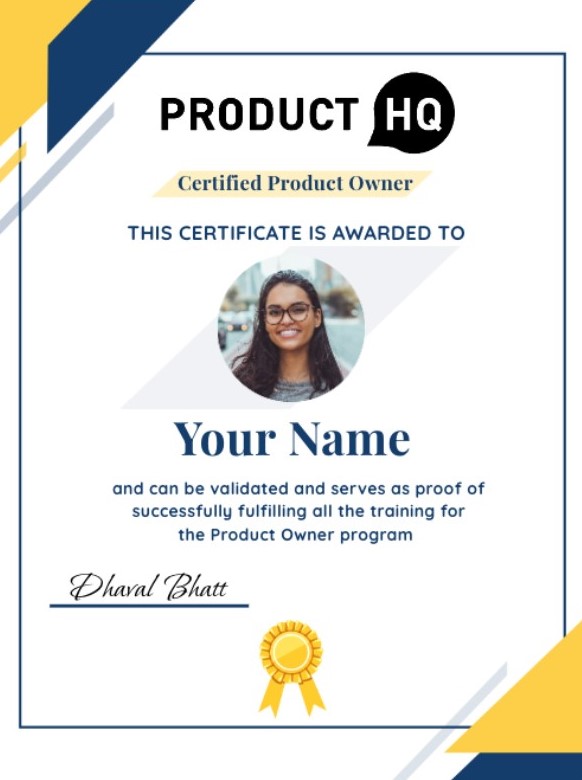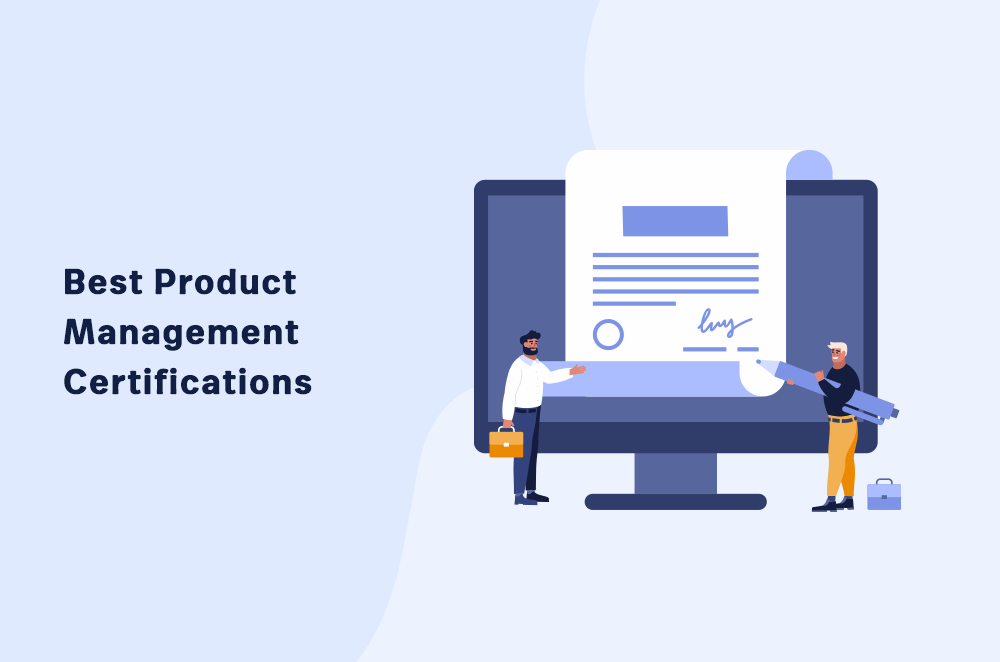Are you searching for the top product owner certifications in 2025?
If you have a knack for attention to detail, meeting tight deadlines, and coming up with creative solutions to complex problems, you’re a perfect fit for the product owner role. However, to become a legit profile and showcase your talent, it is advised to complete a product owner certification.
As a critical component of an agile team, companies can’t afford to hire incompetent profiles for this role. Candidates should convince their potential employers that they are proficient in the art of agile, know the prioritization of tasks, and effectively manage product backlogs. And the best way to do that is by becoming a certified PO.
To help you out, in this post, I’ll list down and review 7 well-recognized product owner certification options in 2025. Let’s jump right in.
What is a Product Owner Certification?
A product owner certification shows that you know how to work with a scrum team whose responsibility is to maximize the value of the product deliverables. This entails defining the product backlog, overseeing the execution of tasks, and ensuring that the deliverables meet the definitions of “Done.” According to the scrum guide, the product owner role is accountable for the final results delivered by the development team. In parallel, your product owner certification shows that you understand the process to ensure the final results are promising.
While the product owners don’t necessarily always have the highest authority, interference in their decisions is highly discouraged, as it defeats the purpose of the position. Furthermore, it’s important to note that the product owner is different from the scrum master. And sometimes a “product manager.” In companies doing Agile, 70% of Product Managers are Product Owners. While the former mainly deals with product backlog management, the latter is considered a “champion” of the scrum methodology and is responsible for communicating updates to outside members (such as people in the boardroom).
Top Product Owner Certifications
As implied earlier, companies pay extra attention when hiring for the role of PO. After all, they’re not going to hand over the product ownership of their million-dollar ideas to anybody. Having an impressive resume is nice, but some employers require proof of your competence, like completing certification courses.
While not mandatory to call yourself a PO (or deliver a successful product, for that matter), if you want to grab the attention of potential employers, you should invest in relevant scrum product owner training and appear in renowned certification exams. There are a bunch of product management courses online that you can enroll in yourself. But when it comes to product owner certification options, the following are recognized everywhere in the world.
1. Certified Product Owner by Product HQ
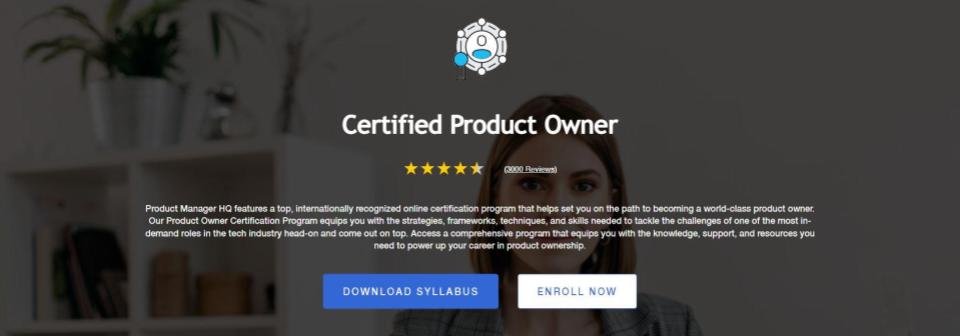
I rated the Certified Product Owner as the best product owner course. You’ll learn the foundation of being a Product Owner, the skills needed to perform exceptionally well at the job, how to ace your product owner interviews, and how to stand out as a more suitable candidate to land the job (with an excellent salary).
This certification course has 90+ highly-interactive lectures, 10+ hours of video content, 5+ downloadable Product Owner templates, and exclusive interviews (more added over time) with product owners in the industry.
Here are a few things you’ll learn in the course:
- How to manage stakeholders and risk
- How to measure and improve your velocity
- How to write user stories (also known as product requirements) that set you and your team up for success
- Measuring Success: How to choose Charts and Metrics to focus on Agile Success
- Release Management – How to release high-quality products that delight your stakeholders and customers
Requirements
The Certified Product Owner course is for aspiring product owners or people who want to learn agile product management skills. In case you have no prior product experience, Product HQ also offers a couple of introductory courses.
2. Professional Scrum Product Owner™ Certifications
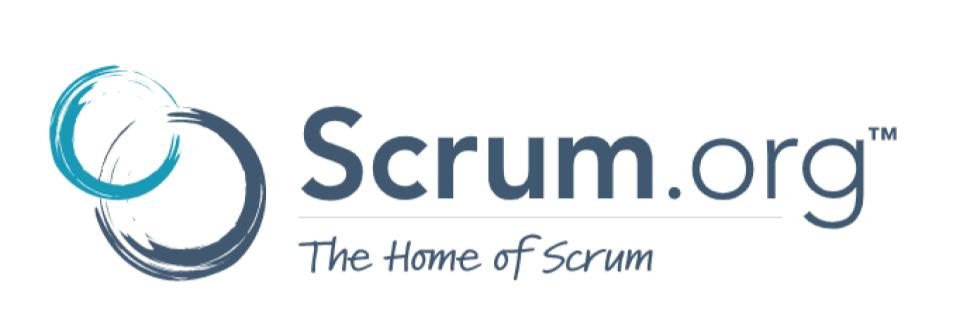
Another solid choice is the Professional Scrum Product Owner Certification (short for PSPO, if that’s a mouthful). Offered by Scrum.org, the PSPO is one of the most well-recognized scrum certifications out there. PSPO-certified professionals are highly regarded in the industry, as the examination is strict and tests candidates on scrum principles. Currently, there are three levels or tiers of the PSPO certification, with a higher tier indicating a higher level of knowledge. These include:
- PSPO I – this is a beginner-level certification demonstrating basic scrum knowledge. Despite being the most basic certification, the holders of PSPO I are highly regarded by employers. As of now, the assessment costs $200.
- PSPO II – holders of this certification demonstrate more advanced knowledge than PSPO I holders. PSPO II tests candidates on all core and additional topics, from product backlog management to business strategy. The price of the PSPO II assessment is $250.
- PSPO III – the highest level of certification, demonstrating an illustrious understanding of the Scrum framework. The assessment for PSPO III will set you back by $500.
The PSPO assessment is a 60-minute exam consisting of 80 multiple-choice questions. Out of all the certifications available, PSPO is the most challenging one to complete. Furthermore, remember that the PSPO is in the English language only.
Requirements
Compared to other product owner certification options, the PSPO is more flexible regarding its prerequisites. There are no special requirements to fulfill. You don’t need to attend any special lectures or classes to take the assessments. However, we do recommend doing that.
3. Certified Scrum Product Owner® (CSPO)

Next on the list is Certified Scrum Product Owner (CSPO) accreditation – offered by the Scrum Alliance. The Alliance is famous for its Certified Scrum Master (CSM) option. The CSPO is one of the two most distinguished certifications (with PSPO being the other). A CSPO-certified professional demonstrates a highly advanced level of knowledge regarding the scrum framework. Specifically, the certification will test your understanding of scrum and your ability to achieve the product vision.
Furthermore, keep in mind that the CSPO doesn’t have a test. All you need to do is to complete a course/receive training (more on that later). Once you become CSPO-certified, your name adds to the official directory of the Scrum Alliance.
Requirements
Unlike PSPO, the CSPO certification has a few requirements that you must fulfill. Here’s what you have to do before appearing for the assessment:
- You must attend a two-day course taught by a Certified Scrum Trainer (CST). Alternatively, you may choose to receive coaching from a Certified Agile Coach (CAC).
- You must also receive either 14-hour long training from your CST or 25 hours of interaction with your CAC.
After completing the requirements above, you must accept the license agreement and finish building your profile on Scrum Alliance. Furthermore, Scrum Alliance offers a 2-year membership at a time. This means that after every two years, you’ll have to renew your certification. Additionally, you’ll be required to maintain your certification by consistently earning Scrum Education Units (SEUs) from Scrum Alliance.
4. SAFe Product Owner/Product Manager
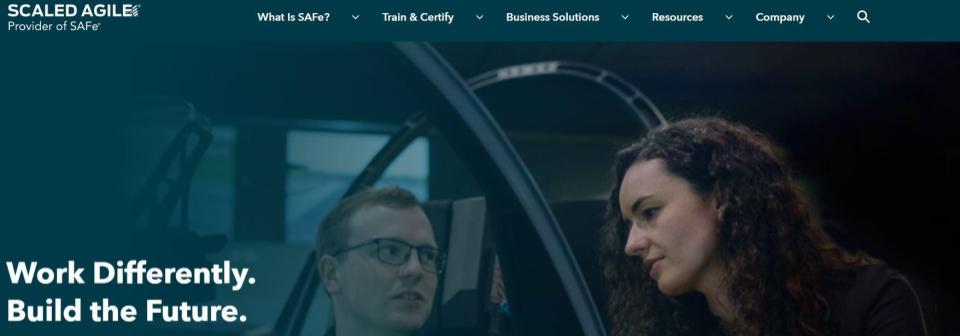
Provided by Scaled Agile, the SAFe® Product Owner/Product Manager certification is a two-day course to prepare professionals in the art of agile. After the completion of this course, attendees walk out with a deep understanding of:
- DevOps culture
- Agile Release Train (ART)
- Backlog management
- Execution of iterations
Upon completion of the course, you’ll also receive a certification that you can use as proof of your knowledge. Furthermore, this training course will enable you to appear for the SAFe® 5 Product Owner/Product Manager or the SAFe® 4 Product Owner/Product Manager (POPM) exam. These are 90-minute long assessments that include 45 multiple-choice questions (MCQs). For the POPM 5, candidates need to get at least 33 out of the 45 questions right, whereas, for the POPM 4, they need to score at least 35.
Requirements
There are no prerequisites to attending the SAFe® POPM course. According to the website, everyone is “welcome to attend the course.” However, the organization recommends attending one of the SAFe® courses and having hands-on experience/relevant certifications. Completing the course will give you a certificate and a 1-year membership in the SAFe community. As for the SAFe® POPM 4 and POPM 5 exams, you must complete the POPM course.
5. PMI Agile Certified Practitioner (PMI-ACP)®
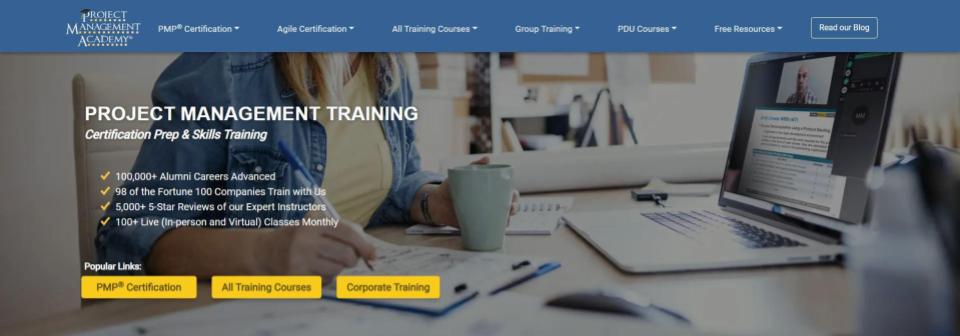
This next option isn’t exactly a “product owner certification,” per se, but rather a comprehensive certification that demonstrates everything. The Agile Certified Practitioner (PMI-ACP)®, by the Project Management Institute, tests your knowledge of agile principles. This certification covers not only the scrum foundations but also Test-Driven Development (TDD), Kanban, Extreme Programming (XP), and Lean. Considering that, the PMI-ACP will help you demonstrate an all-around knowledge of the agile framework, making you proficient in different approaches, thereby opening doors to a more significant number of possibilities. To get this certification, you’ll have to appear in a 3-hour exam with 120 multiple-choice questions. For PMI members, the fee is $435, whereas non-members have to pay $495.
Requirements
The PMI-ACP certification exam has some of the most stringent requirements, including:
- At least a secondary-level degree
- 8 months of experience with agile project(s), acquired within the last 3 years
- 12 months of general project experience accumulated within the last 5 years
- 12 contact hours of training in agile
To maintain your PMI-ACP certification, every 3 years, you’ll need to earn 30 professional development units (PDUs) in relevant topics.
6. Your Scrum Product Owner Accredited Certification™
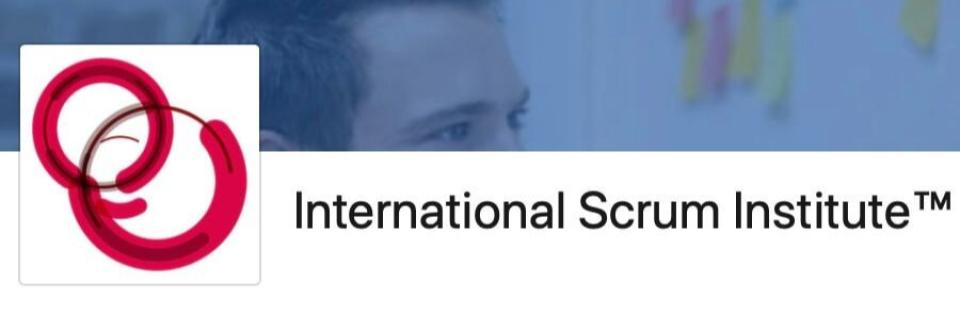 The “Your Scrum Product Owner Accredited Certification™” program is by the Scrum Institute. Holders of this certification demonstrate fundamental knowledge of the scrum methodology and are considered fit for the product owner role.
The “Your Scrum Product Owner Accredited Certification™” program is by the Scrum Institute. Holders of this certification demonstrate fundamental knowledge of the scrum methodology and are considered fit for the product owner role.
This product owner certification is unique because it lasts a lifetime and doesn’t require you to renew it every few years. Your Scrum Product Owner Accredited Certification™ exam lasts an hour and includes 50 multiple-choice questions. You must get at least 60% of your answers right to pass the exam.
The assessment costs $99, making it one of the more affordable certifications. What I like most about this certification is that the Scrum Institute offers a 100% money-back guarantee in case you cannot clear it in your first attempt (you can redo it for free up to 10 times and can demand a full refund after your last try).
Requirements
There are no special requirements to complete Your Scrum Product Owner Accredited Certification™. All you have to do is to register yourself for the certification program. You’ll receive special preparation material and an “exam access code.” This code doesn’t expire, meaning you can take as long as you want to prepare for the exam.
7. EXIN Agile Scrum Product Owner
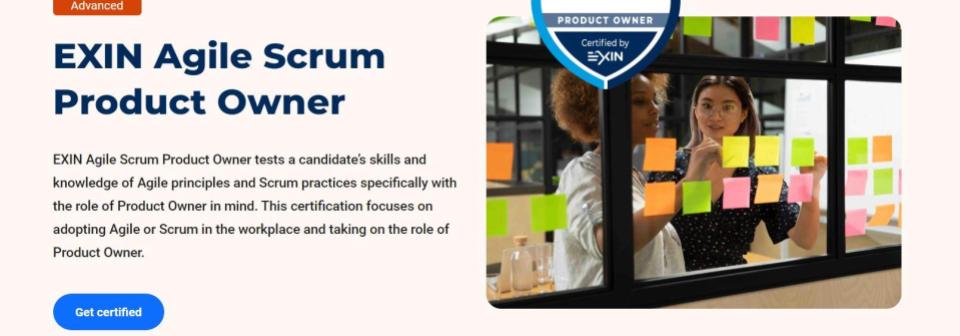
The EXIN Agile Scrum Product Owner program is the last certification on the list. This certification will help you demonstrate advanced proficiency in agile principles – especially scrum practices – making you an ideal profile for product ownership. It will test you on how you can take on the product owner role, your ability to handle complex projects, and how you can deliver value, among other things. The exam lasts 90 minutes, consists of 40 MCQs, and is available in 7 languages (English, Latin American Spanish, Brazilian, French, Portuguese, German, and Dutch).
The examination fee isn’t fixed and will vary from country to country.
Requirements
To appear for the EXIN Agile Scrum Product Owner exam, you’ll need to complete an EXIN Accredited EXIN Agile Scrum Product Owner training program and practical assignments.
How to Become a Great Product Owner
Will completing one of the certifications above make you a great product owner? It will give you the competitive edge you need over your peers. To prepare for any certification, you’ll need to:
- Develop a knack for project management (all product owners are project managers in a way)
- Know how to define user stories and turn them into actual features
- Rally your team members and work towards the product vision
- Develop product roadmaps effectively, as prioritizing is key
- Have some level of experience/exposure to software development
Lastly, having a firm belief in the agile manifesto is a prerequisite. After building these foundations, you can worry about choosing an appropriate product owner certification to excel in your career. While your decision could vary based on your goals and budget, out of all the options listed earlier, the best ones are the PSPO and CSPO. But that doesn’t mean that completing another program would make others question your abilities.
Frequently Asked Questions
Here are answers to some of the most common questions about product owner certifications:
What is the best certification for a product owner?
The best certification to become a great product owner is the Product Owner credential from the Product HQ. This product owner certification helps you understand how to manage software development projects and create a product roadmap for your company’s success.
What certifications do I need to become a product owner?
To become a product owner, you should take one of the certifications above and then have at least four years of experience as an executive in your company or be a product manager.
How much does Product Owner Certification cost?
A Product Owner Certification costs $299 – $1000, depending on the type of curriculum you’re looking for.
Is a Certified Scrum Product Owner worth it?
The Certified Scrum Product Owner is worth it if you want to become a product owner. If you’re new to the role, other certifications can prepare you for it and broaden your skillset.
